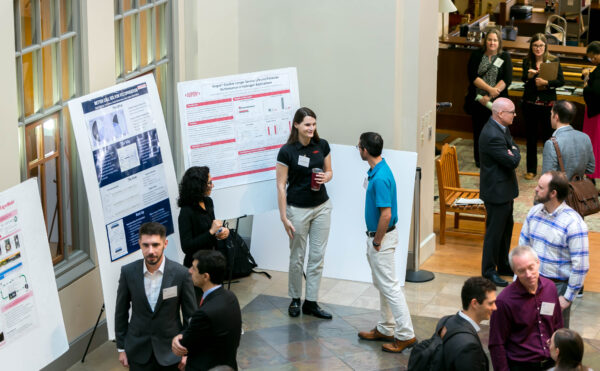Innovation Day 2024
The Science History Institute and the Society of Chemical Industry America presented the 21st annual Innovation Day on September 9, 2024.
This hybrid event, open to members of SCI America, featured in-person and online sessions. In-person sessions of Innovation Day will be held at the Science History Institute Conference Center in historic Old City Philadelphia.
Find directions and parking information here. Please contact InnovationDay@sciencehistory.org with questions about Innovation Day.
Overview
The Innovation Day Steering Committee (made up of R&D staff of SCI’s member companies) built an exciting agenda for the meeting. We open with a poster session and networking, followed by the annual Schlinger Symposium with an address from the SCI 2024 Gordon E. Moore Medalist, Caleb Funk from DuPont. Then, panel experts offered stimulating presentations and discussions on topics that explore the year’s themes, Energy Storage and Advanced Mobility and Regulatory Needs Driving the Chemical Industry.
Energy Storage and Advanced Mobility, Track 1
Innovative Materials for Advanced Mobility
As electrification transforms global mobility, the safety and efficiency of rechargeable energy storage systems (RESS) in electric vehicles (EVs) and micromobility devices like e-bikes are paramount. This session delved into the latest advancements in materials and manufacturing techniques for EV battery cell canisters and pack assemblies. Attendees will gain insights into the evolving global and regional safety standards, key features of battery pack protection materials, and the types and materials used in automotive battery cell canisters. The discussion covered manufacturing challenges, laboratory simulation methods by the chemical industry, and innovative solutions to enhance production efficiency. Emphasis was placed on techniques to mitigate thermal runaway risks, improve mechanical properties, and demonstrate how environmental sustainability can lead to overall cost reductions.
Presentations
Material Trends for Effective and Functional Protection of EV Batteries
Speaker:
Sze-Sze Ng
Principal TS&D Scientist, Dow, Inc.
Electrification is transforming mobility on a scale that truly impacts the global economy. The rechargeable energy storage system (RESS)—whether in electric vehicles (EV) or in micromobility devices such as e-bikes—continues to pose safety risks from potential thermal runaway events. Global and regional safety standards are being updated constantly to reflect improvements in engineering design and the evolving understanding of how components and assembly materials may affect RESS performance. A combination of thermal propagation mitigation and excellent mechanical properties continues to drive material research. A review of global safety standard trends, as well as general characteristics of EV battery pack assembly and protection materials, was presented, highlighting key features considered by OEMs when developing new material specifications.
Battery Cell Canisters for E-Mobility: Overview, Production Methods, and Chemical Solutions
Speaker:
Tom Demopolis
Sr. Manager COI – Global Forming and AM Forging Technologies, Quaker Houghton
E-Mobility is driven by banks of interconnected battery cells that collectively deliver power on demand. We gave an overview of the types and materials typically used to produce the canisters for automotive battery cells. An industrial perspective was given on manufacturing challenges for forming cell canisters, describing methods used by partners in the chemical industry to simulate them in the laboratory, and solutions to effectively address these challenges. Emphasis was given to techniques used to improve production efficiency, and to show how environmental sustainability can provide an overall cost reduction.
Energy Storage and Advanced Mobility, Track 2
Innovative Energy Solutions: Opportunities for the Chemical Industry and Advancing Grid Electrification
The electricity industry is rapidly evolving with the introduction of new technologies such as solar PV and batteries, alongside new goals like electrification and CO2 reduction. These changes, coupled with increasing electricity demands from electric vehicles and heat pumps, present both challenges and opportunities for the chemical industry. These global shifts toward renewable energy sources underscores the need for effective management of intermittent energy supply. High-power energy storage devices, particularly electrochemical capacitors or supercapacitors, offer a promising solution due to their ability to deliver rapid bursts of energy and facilitate a smooth transition between energy supply and demand. This session explored the dynamic transformations within the electric grid, highlight the potential benefits for the chemical industry, and delve into the evolution of supercapacitors, comparing them with traditional batteries and discussing strategies to optimize their porous structure for enhanced performance.
Presentations
The Electricity Grid and the Chemical Industry: Opportunities in the Chaos
Speaker:
Paul Komor
Research Faculty, Renewable and Sustainable Energy Institute (RASEI); Lecturer, MENV, University of Colorado Boulder
The electricity industry is changing and innovating at a rapid pace. New technologies (solar PV, batteries), new industry goals (electrification, CO2 reduction), and new electricity demands (electric vehicles, heat pumps) are creating challenges and opportunities. This talk explained how and why the electric grid is changing, and pointed to opportunities this creates for the chemical industry.
Enhancing Supercapacitor Performance for Advancing Grid Electrification
Speaker:
Ankur Gupta
Assistant Professor, Department of Chemical and Biological Engineering; Affiliate, Material Science and Engineering Program, University of Colorado Boulder
As the global shift towards renewable energy sources increases, the challenge of managing intermittent energy supply becomes more pronounced. To address this, high-power energy storage devices are needed to deliver rapid bursts of energy and facilitate a smooth transition between energy supply and demand. Electrochemical capacitors, or supercapacitors, offer a promising solution due to their ability to store energy through electrical double layers. This talk explored the evolution of supercapacitors, differentiate them from traditional batteries, and delved into strategies for optimizing their porous structure to achieve superior performance.
Regulatory Needs Driving the Chemical Industry
The chemicals and materials industry is increasingly impacted by regulations and a drive to safer and more sustainable materials. These regulatory drivers impact the direction of corporate research and are a major factor when deciding on technical approaches to problems. Our panel of experts explained how chemicals get prioritized for study and restriction, the kind of analysis done to inform policy, why these restrictions are important to society, and how industry and individual researchers can respond and better prepare themselves for the new realities of the regulatory landscape.
Understanding TSCA: How Chemicals Become Priorities
Speaker:
Nancy Beck
Director of Regulatory Science, Hunton Andrews Kurth LLP
This presentation provided an overview of how chemicals become priorities for evaluation and possible regulatory actions under the Toxic Substances Control Act (TSCA). It also provided an overview of the status and outlook for future priorities for evaluation under TSCA at EPA.
Leading Sustainability in a Dynamic Environment
Speaker:
Scott Collick
Vice President of Sustainability, DuPont
Sustainability has become a critical issue with significantly increased regulatory and stakeholder expectations. ESG is a very dynamic environment and the external environment is heating up with increasing pressure for disclosure and action. This presentation will focus on how science and innovation can address the world’s most pressing sustainability challenges (including climate change, circularity, nature, water, and substances of concern) and how DuPont is working on reducing its footprint and expanding its handprint through its 2030 sustainability goals.
Chemical Management: Supporting Science-Based Regulatory Decision Making
Kimberly Wise White, Vice President, Regulatory and Scientific Affairs, American Chemistry Council
Many important factors are involved in robust chemical management in the United States and around the world. Governments worldwide establish chemical safety guidelines and regulations. Since scientific understanding is always evolving, a regulatory system that can adapt to advances in science and technology helps promote the safe use of the essential, innovative products made possible by chemistry. In order to drive policies and regulations based on the best available data, science, and approaches, it is critical to be engaged in the decision-making process. Stakeholder participation helps ensure that sufficient information to conduct thorough evaluations is utilized and includes the most relevant hazard, use, and exposure information. Access to accurate data based on realistic scenarios and the best available science is necessary to effectively underlie decision making.
Schedule
Attire: Business/Business Casual
| 8:30–10:30am In-Person | Check-in Opens (Lobby) Coffee and continental breakfast until 9:45 a.m. | |
| 9:15–10:10am In-Person/Online | Morning Programming From Lab Bench to Leadership: Navigating Success in the Chemical Industry Organized by Deidre Sandrock and Elizabeth Ross-Medgaarden This panel discussion features technology leaders from the chemical industry. They’ll share their career journeys, insights on navigating the industry, and the key skills and strategies that have propelled them to success. This session is designed to inspire and offer practical guidance to scientists at all levels who are looking to build rewarding careers within the chemical industry. | |
| 10:15–11:15am In-Person | Poster Session (in-person attendees and presenters) Download the Poster Session Guide (PDF) and Posters (PDF) | |
| 11:30am In-Person | Innovation Day Luncheon | |
| 12:15pm In-Person/Online | Welcome David A. Cole, President and CEO, Science History Institute Roger Kearns, President and CEO, NOVA Chemicals, and Chair, SCI America The Warren G. Schlinger Symposium Caleb Funk, DuPont, 2024 SCI Gordon E. Moore Medalist | |
| 1–1:45pm In-Person/Online | Break and Poster Networking | |
| 1:45–3:15pm In-Person/Online | Breakout Panels: Session 1 Energy Storage and Advanced Mobility Organized by Bob Butterick, Dow; Robert Harding, W. R. Grace; Robert Li, ExxonMobil; Arthur Martin, Arkema; Peter Loggenberg, Trecora; Dave Slinkman, Quaker Houghton; and Chris Wren, Hexion Track 1 Innovative Materials for Advanced Mobility Track 2 Innovative Energy Solutions: Opportunities for the Chemical Industry and Advancing Grid Electrification | |
| 3:15–3:30pm | Break; Museum closes at 3:30pm | |
| 3:30–5pm In-Person/Online | Breakout Panels: Session 2 Regulatory Needs Driving the Chemical Industry Organized by Jeff Carbeck, Eastman; Michael Demko, Dupont; Felicia Parks, Hallstar; and Mitch Refvik, Chevron Phillips Chemical | |
| 5–6pm In-Person | Cocktails and Networking | |
Awards

SCI Gordon E. Moore Medal
The Society of Chemical Industry, America Group (SCI America), established the SCI Gordon E. Moore Medal to recognize early-career success in innovation, as reflected both in market impact and improvement to quality of life. By highlighting extraordinary individuals and their work, SCI America aims to promote public understanding of research and development in modern chemical industries, enhance the interest of students in applied chemistry by providing role models, and emphasize the role of creative research in the global economy.
The 2024 Moore Medal was awarded to Caleb Funk.

SCI Perkin Medal
The SCI Perkin Medal was established to commemorate the 50th anniversary of the discovery of mauvene. Today the medal is widely acknowledged as the highest honor in American industrial chemistry. William Henry Perkin was a founding member of SCI, and this medal was first presented in New York to Perkin himself.
The 2024 Perkin Medal was awarded to Max McDaniel.
Sponsors
Premier Sponsor
The Warren and Katharine Schlinger Foundation
Presenting Sponsors
Chemours
Eastman
ExxonMobil Product Solutions
Endorsing Sponsor
Chevron Phillips Chemical Co. LP
Sustaining Sponsors
Arkema
Dow
DuPont
Hexion, Inc.
LyondellBasell
Olin
Quaker Houghton
Univar Solutions
W. R. Grace & Co.
Contributing Sponsors
Air Liquide NA
BASF
COIM USA
Hallstar
NOVA Chemicals
Trecora
Steering Committee
Robert Butterick
Northeast Dow Center Site Leader
Dow Inc.
Jeff Carbeck
Vice President of Corporate Innovation
Eastman Chemical Company
Michael Demko
Technology Leader, Tedlar
DuPont
Robert Harding
Senior Technology Advisor
W. R. Grace & Company
Robert Li
Novel Products Research Manager
ExxonMobil Technology and Engineering
Peter Loggenberg
Executive Vice President of Specialty Polymers and Corporate Strategy
Trecora
Arthur W. Martin
Vice President R&D North America
Arkema Inc.
Felicia Parks
Technical Director, North America
Hallstar
Mitchell D. Refvik
Senior Manager Polyolefin Catalysis
Chevron Phillips Chemical Company LP
Elizabeth I. Ross-Medgaarden
Sr. Manager, Acetyls and Basic & Fundamental R&D
Houston Technology Center
LyondellBasell
Deidre L. Sandrock
Director of Sustainability and Innovation
Milliken & Company
Dave Slinkman
Senior Vice President, R&D, and Chief Technology Officer
Quaker Houghton
Chris Wren
North America OSB R&D Leader
Hexion



